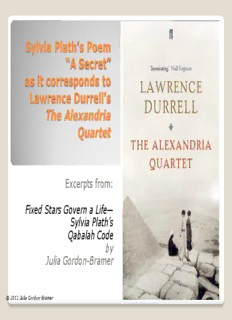
Plath's "A Secret" and Durrell's The Alexandria - Nighttimes.com PDF
Preview Plath's "A Secret" and Durrell's The Alexandria - Nighttimes.com
Sylvia Plath’s Poem “A Secret” as it corresponds to Lawrence Durrell’s The Alexandria Quartet Excerpts from: Fixed Stars Govern a Life— Sylvia Plath’s Qabalah Code by Julia Gordon-Bramer © 2012 Ju lia Gordon-Bramer BA in Literature and Language from Webster University, St. Louis, Missouri USA MFA in Creative Writing (poetry and prose) from University of MO-St. Louis Teaches Arts and Humanities, Philosophy and World Literature at Lindenwood University, St. Louis, Missouri USA tarot reader for 32+ years student of mythology, Qabalah, Jungian alchemy and Hermeticism Bio- Julia Gordon-Bramer © 2012 Julia Gordon-Bramer “A Secret” by Sylvia Plath © 2012 Julia Gordon-Bramer Each Plath poem has 6 facets: Qabalah and Tarot Alchemy Durrell had similar Mythology themes and History and the World sub-themes Astrology and Astronomy embedded Humanities and the Arts in his work. There are six facets to each Ariel poem by Plath: © 2012 Julia Gordon-Bramer “A Secret” pays tribute to Durrell’s The Alexandria Quartet, corresponding to Humanities & the Arts facet of the poem. … with special emphasis on the first book, Justine, as it relates to the Justice Tarot card. © 2012 Julia Gordon-Bramer The other facets mirror and correspond with one another Briefly, The Tarot and Qabalah facet: Justice will be done; an impartial weighing of sides or ideas; settling conflict; the law; equilibrium; balance; Karma; cause and effect. © 2012 Julia Gordon-Bramer The Alchemical facet: relates to references of the famous alchemist Paracelsus, studied by The Alexandria Quartet character, Capodistria. There are also many correspondences to the chemistry of practical alchemy and Rosicrucianism throughout the poem. The Mythology facet pays tribute to Athene (Minerva to the Romans), the goddess on the Justice card. a.k.a. “Athena” Athene is sometimes called Hippia, meaning “of Horses,” “Hippopotamus” meaning “water horse.” The History and the World facet addresses London’s Square Mile, where ruins of a Roman temple to Minerva have been discovered. Collective references to smallpox, illegitimate children, London, and gout point to England’s King Henry VIII--“A Secret” becomes a story of his wives. Another powerful woman, Marie Antoinette, also surfaces in the poem.
Description: